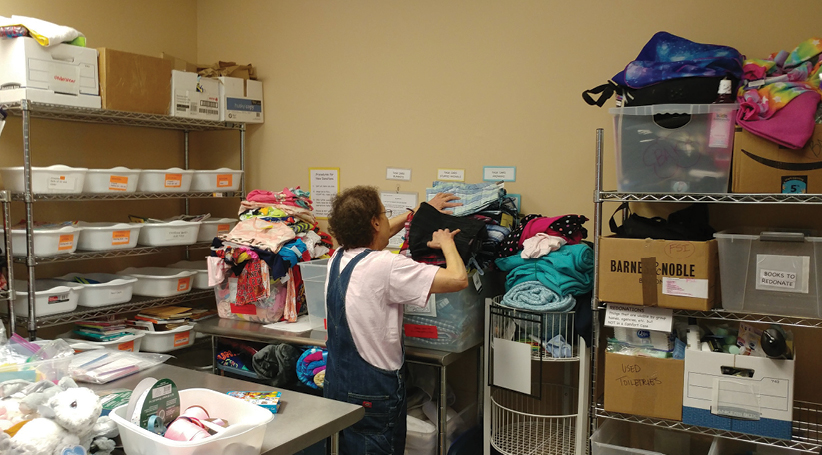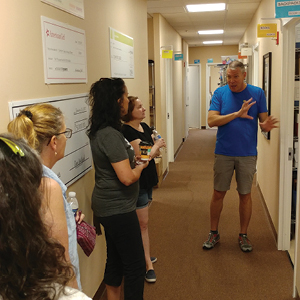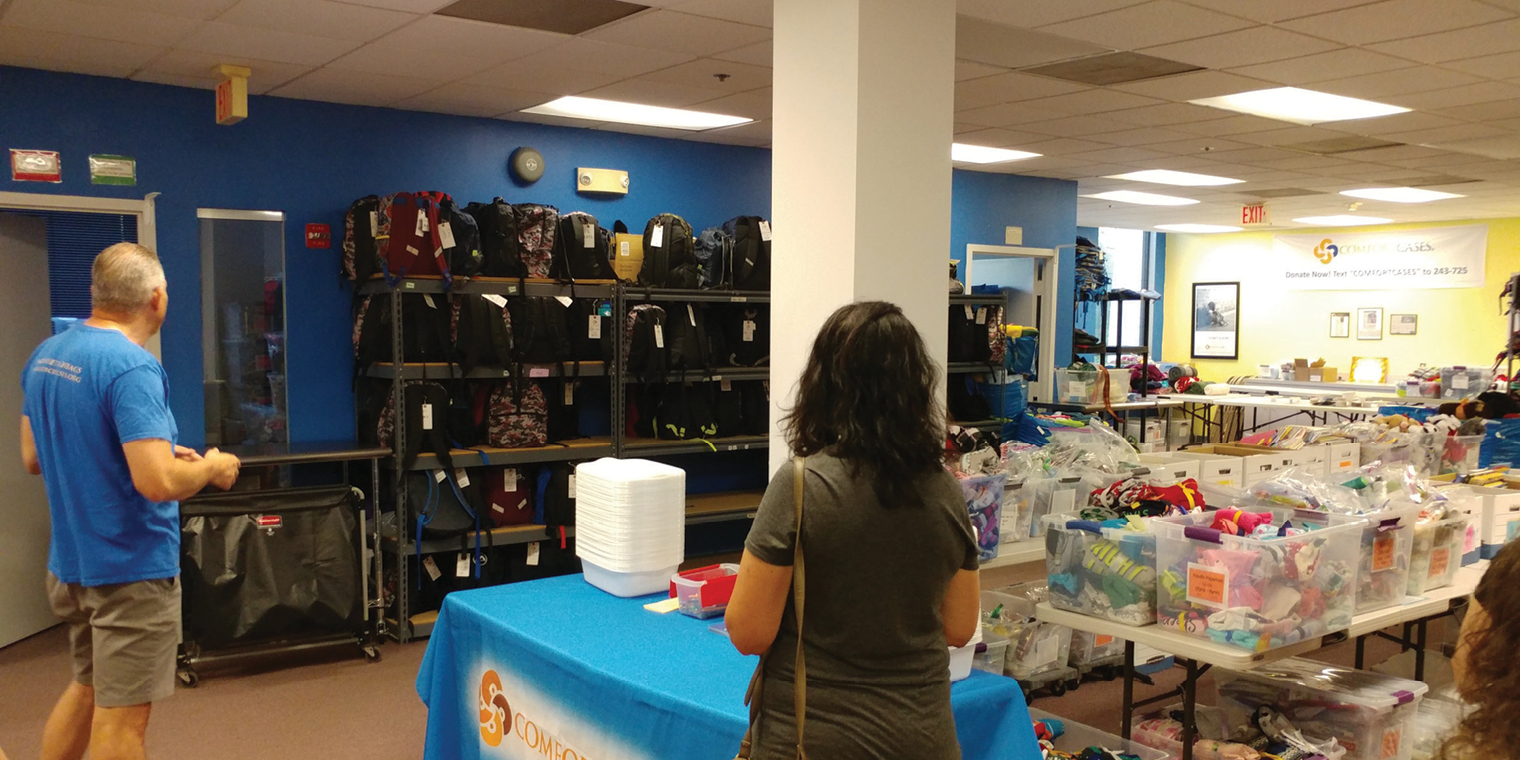We are often reminded: you never know what others are going through. For children living within the foster care system, this is especially true because they are often unnoticed. Rob Scheer, co-founder of Comfort Cases, says these children are sometimes almost “invisible…disposable.” He should know because he himself was in the system as a child.
Attending high school, Rob knew one thing—if he was to make anything of himself, he needed to get an education so he read everything he could get his hands on. There was no guidance counselor showing him the way in spite of being an A/B student. When he graduated, he joined the military— just to survive. “I needed a roof over my head, and food,” Scheer admits. “Hunger is something I can never forget.” He persevered after the service, working his way up in banking.
When Rob and his husband, Reece Scheer, started talking about adopting, they discovered that foster-to-adopt was their best option. With their now-four children, they work to instill solid values of love and caring. At first that meant working on toy drives for children at the holidays. Then realizing that their efforts were largely forgotten by December 26, they changed focus and Comfort Cases was born.
“As people we have to be doers,” says Rob. “Can you imagine what the world would be like if all of us were doers? You can make a big difference with just a little effort. Let’s be doers”
When a child enters the foster care system, 90% of the time from the back of a police cruiser, the child’s meager belongings are typically stuffed in a trash bag and that’s how the child arrives at the foster home, and how they move from one foster home to another (The average number of moves per child is seven homes). That was Rob’s experience as well.
The family started a campaign to create something better, something that showed that these children were valued. It would be a backpack with some essential items along with personal items. Starting the effort in Montgomery County, they planned to make about 200 Comfort Cases a year. However, after only 4 ½ years, the 98%-volunteer Comfort Cases team has shipped 35,000 packages to 34 states, plus D.C. and Puerto Rico.

Donations need to be counted and sorted upon arrival
Most days, several volunteers arrive at the ground floor of a Rockville office building to receive donations, count, inspect, sort, pack, and ship Comfort Cases to social service agencies across the country. Volunteers work days, sometimes weeknights or weekends, and schools will often do volunteer work as a school project. Donations have come from every state in the U.S. and every continent except Antarctica.
There are treasured items in each case. In addition to items like soap, shampoo, and other necessities, there is a book. As Rob relates, ”A book is meant to be loved in the mind, loved in the heart, and then passed on. It can also offer a great escape sometimes.” There are activity items—a coloring book and crayons for the young children, a journal with pens and pencils for older children. This is a favorite of many children because it gives them a chance to express themselves, write their ideas, illustrations, or music.
Pajamas make it into every case, with a tag, and wrapped with ribbon. Why a tag? Because one of the Scheers’ own children received PJ’s with a tag, smiled, and said, “I’ve never had a new nightgown before.” The ribbon reminds them that it is a gift to someone special. And every case must have a stuffed animal because everyone, no matter what age, loves a stuffed animal.
Comfort Cases also creates special packs for newborns–2-year-olds. Foster families do not necessarily prepare properly for very young children so the team has new baby cases which include baby wipes, binkies, diaper ointment, a changing table, and bottle warmer.
This outstanding organization, doing so much with so little, has attracted national attention, including coverage via local news outlets, Upworthy, the Hallmark Channel, and Ellen. Ellen, in cooperation with Samsonite, provided $50,000 to expand their program. Comfort Cases discovered the Samsonite Comfort XL, a 32” duffel bag that is now included with every new case, further removing the stigma of the traditional trash bag “luggage.”
Of course the extraordinary effort is not without significant costs. Even by using mostly volunteers, major expenses continue, such as all shipping costs entirely paid by Comfort Cases. “We’re still looking for the right corporate sponsors,” says Rob.

Rob Scheer conducts a tour of the facility for new volunteers
How has Comfort Cases been able to accomplish so much in less than five years? Rob believes, “It’s a matter of passion. We all have a story to tell and fortunately our story has moved people to action. But it’s our community and our volunteers that have built this charity and have made everything possible thus far. Look, there are only two things these children ask: “Don’t call us foster children. We’re just children like anyone else,” and “Don’t make us carry a trash bag again.” It’s about doing something for them because they matter.”
Graduation rates among children living in foster homes are appallingly low—54% graduate from high school, 2% from college. Rob and Reece are making a difference here also. They have started sponsoring scholarships to send children to college.
Listening to Rob, it’s obvious that he has enormous passion for the foster community. At the same time, it is evident that he is also working toward a higher purpose—helping people see the value in reaching beyond themselves to care about their communities. Rob is also the national spokesperson for Riverbend College in Montgomery, WV, opening this fall for youth aging out of the foster care system. Riverbend, established by KVC Health Systems, will be “tailored to seamlessly support older youth from foster care into high-demand careers paying sustainable wages.” As Rob reminds us, “education is the only thing that separates us.”
Rob encourages everyone to “be a doer. If you can manage it, adopt. If you can’t adopt, foster. If you can’t foster, then volunteer, or donate, or simply start by educating yourself on your community’s needs.”
Be a doer.
Learn more about Comfort Cases and how you can get involved as a volunteer or donor.
Contact them at 301-605-7813.
Pictured at top: Final steps to ship Comfort Cases to children across the country






